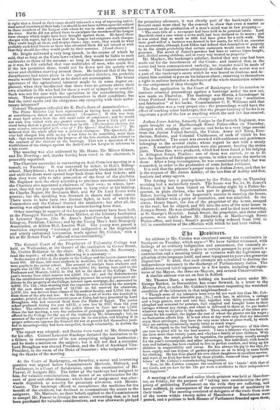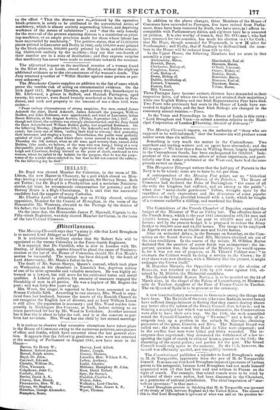Zbe 41)robintes.
An address to Mr. Cobden was circulated among his constituents in Stockport on Tuesday, which says—" We have further witnessed, with feelings of no ordinary indignation and amazement, the unmanly at- tempt, in various quarters, to give to certain passages in your speech a construction and a meaning totally at variance with the legitimate ap- plication of the language itself, and most repugnant to your own generous disposition." It adds, that such attempts are calculated to destroy the independence necessary to the discharge of Parliamentary duties. The address received 5,000 signatures in a few hours, including the signa- tures of the Mayor, the three ex-Mayors, and several Conservatives. A similar address was set on foot in Salford.
Mr. Thomas Hunt, a tenant holding six hundred acres under Mr.. George Bankes, in Dorsetshire, has come forward, in a letter to the Morning Post, to refute Mr. Cobden's statement respecting the wretched' condition of the labourers in that neighbourhood- " Though some of my labourers have even 6d. per week less than Mr. Cob- den mentioned as their miserable pay, [8s.,] each has, in addition, a cottage
and a large garden, rent and rate tree, together with thirty perches of land.
ploughed and manured for potatoes, fuel supplied and brought home to their cottages without any charge, and wheat is delivered to them at 6s. per bushel whatever may be its price in the market. Thus, independent of the other pro- visions for his comfort, the higher the cost of wheat the greater are his wages ; no fluctuation affects him. It is not when at day-work only that my labourers enjoy these privileges; they have the very same when at piece-work, by which they are earning occasionally nearly twice as much wages. " With regard to the bad feeding, clothing, and the ignorance of this class, one case in point will be the best answer. I have a labourer who has been on the farm more than twenty years, and who has a family of nine children. With the cottage, the ample garden for vegetables, the potato-crop, usually enough for the year's consumption, and other advantages, this individual, with honest care and industry, has been enabled to live in perfect comfort, and bring up his children in respectability and virtue. He has always his pig in the stye for home supply, and can dispose of garden-produce so as to bring in some funds for clothing. He has thus placed his two eldest daughters in excellent service,- and want of no kind has been felt by those pitiable, worse-off than paupers or felons' of Mr. Cobden's manufacturing imagination. " Now, let Mr. Cobden compare the condition of his ' hands' with that of my hinds, and see how far his 12s. per week contributes to their independence and happiness."
A meeting of the stuff and calico block-printers was held at Manches- ter, on Friday, for the purpose of " taking into consideration the pro- priety of petitioning Parliament on the evils they are suffering, and have suffered, in consequence of the unrestricted use of machinery in their trade." The meeting consisted of delegates of the trade from most of the towns within twenty miles of Manchester Resolutions were passed, and a petition to both Houses of Parliament founded upon them,
to the effect " That the distress now eaverienced by the operative block-printers, is solely to be attributed to the unrestricted action of machinery, which is almost entirely superseding labour, and depriving workmen of the means of subsistence " ; and " that the only remedy for the removal of the present alarming distress is a restriction on print- ing-machines, or an ample provision made for those whose labour has been superseded by machinery." The petition states, that of 11,000,000 pieces printed in Lancaster and Derby in 1842, only 100,000 were printed by the block-printers, 900,000 partly printed by them, and the remain- ing 10,000,000 entirely by the machine ; they say that one-fourth of their number are in a state of destitution ; and they express surprise that machinery has never been made to contribute towards the revenue.
The adjourned inquest on the mutilated remains of a woman found in the River Aire, at Leeds, closed on Monday, without the slightest additional evidence as to the circumstances of the woman's death. The Jury returned a verdict of " Wilful Murder against some person or per- sons unknown."
The Manchester Couriersupplies an addition to the list of cases which prove the terrible risk of acting on circumstantial evidence. On the 26th April 1817, Margaret Marsden, aged seventy-five, housekeeper to Mr. Littlewood, a grocer in Salford, and Hannah Partington, aged twenty, his servant, were found brutally murdered at his house in Pen- dleton, and cash and property to the amount of mo.e than 160/. were stolen- " From various circumstances of strong suspicion, five men, named James Ashcroft the elder, David Ashcroft, James Ashcroft the younger, William Holden, and John Robinson, were apprehended, and tried at Lancaster, before Baron Richards, at the August Assizes, (Friday, September 5th,) 1817. Al- though not direct, the evidence was strongly circumstantial; and the Jury found the three Ashcroft, and William Holden guilty, but acquitted Robinson. On the following Monday, (September 8th,) the Aahcrofts and Holden were exe- cuted; but every one of them, 'calling their God to witness,' died protesting their innocence and singing a hymn. Nevertheless, the public were perfectly satisfied of their guilt ; about which there never seemed to be a doubt, until Thursday the 9th instant, when an old man, aged seventy-four, named John Holden, (the uncle, we believe, of the man who was hung,) living at a very disreputable place called Egypt, on the right-hand side of the road between Leigh and Chowbent, finding himself on the point of death. confessed to two women, whom he called to the bedside for the purpose, that he was the perpe- trator of the murder above referred to, but that he did not commit the robbery. On the following day he died."



























 Previous page
Previous page